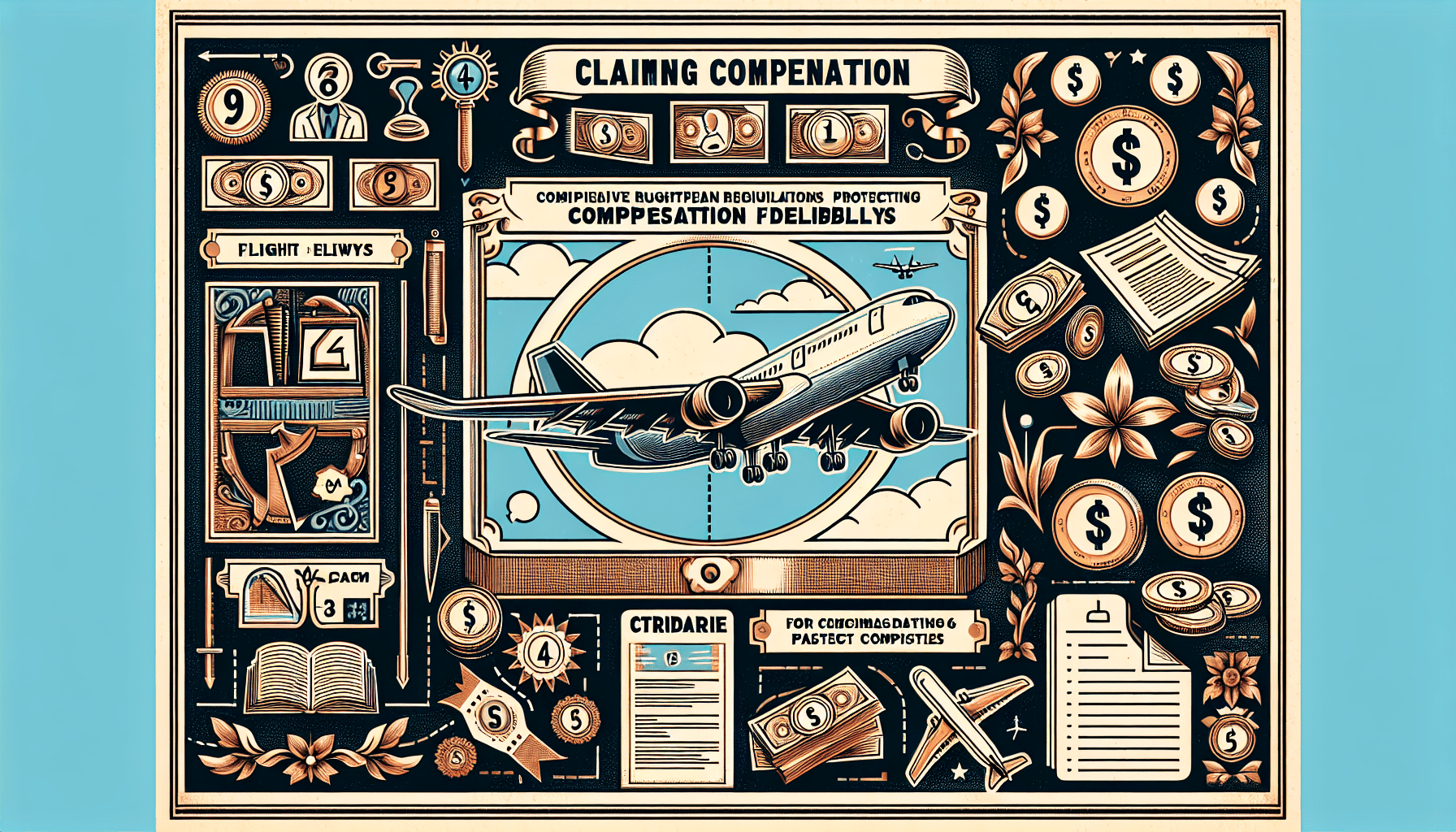18pack Travel Bottles for Toiletries,TSA Approved Silicone Travel size Containers for Toiletries,Leak Proof Refillable Liqus Shampoo And Conditioner Travel Essentials toiletry Bottles
$9.99 (as of April 20, 2025 04:48 GMT +00:00 - More info)Air travel can be stressful, especially when your flight gets delayed. But if you find yourself stuck in Europe due to a delayed flight, there is some good news. Thanks to the European Union regulation known as EU 261, passengers who experience significant delays, cancellations, or denied boarding are entitled to compensation. This regulation aims to provide protections for airline passengers and covers costs caused by travel disruptions. Whether you are a European resident or not, as long as your flight operates in the EU, you may be eligible for reimbursement. The amount of compensation you can receive varies depending on the length of your flight, and you may also be entitled to benefits such as free meals, accommodations, and transportation. However, it’s important to keep in mind that not all delays are eligible for compensation, so make sure to gather evidence and submit your claim in a timely manner.
Shop These Accessories for a Comfortable Trip
Understanding EU 261
Air travel can be stressful, especially when your flight gets delayed. At best, you might be stuck in the airport longer than you’d hoped for. But at worst, a late flight can result in unexpected hotel stays and other surprise expenses. In some cases, you could also miss your connecting flight due to a delay, creating a chain of more hassle and travel headaches.
Thankfully, you can breathe a sigh of relief when traveling through Europe, thanks to a European Union regulation known as EU 261. The regulation aims to provide protections for airline passengers who aren’t able to travel as scheduled due to significant delays, cancellations, or denied boarding. Specifically, fliers can receive compensation to make up for their trouble and cover costs caused by the travel disruption.
Coverage of the regulation
To be eligible for compensation under EU 261, you don’t have to be a European resident or citizen, but your flight must operate in the EU (including any journey that departs from or arrives in an EU country). This includes the 27 EU states and most of their territories, as well as Iceland, Norway, and Switzerland. Note that for a flight arriving in the EU from another region to qualify, it must be operated by a European airline.
Eligibility requirements
To be eligible for compensation under EU 261, you must meet certain requirements. These include experiencing a delay of at least two hours for flights of 1,500 kilometers or less, a delay of at least three hours for intra-EU flights exceeding 1,500 kilometers (or between 1,500 and 3,500 kilometers for other flights), or a delay of at least four hours for trips longer than 3,500 kilometers.
Compensation Guidelines
As long as you aren’t flying with a discounted ticket (not including travel points and frequent flier benefits) and you haven’t already received compensation or a new booking from the airline, there’s a good chance you’re entitled to reimbursement for your delayed European flight.
Conditions for compensation
Under EU 261, passengers are entitled to benefits if they experience the specified delays mentioned earlier. These benefits include free meals and refreshments, two phone calls, and hotel accommodations and transportation when required.
Amount of compensation based on flight distance
The compensation amount you can receive under EU 261 depends on the length of your flight. For flights traveling 1,500 kilometers or less, you can expect 250 euros (about $270). For intra-EU flights longer than 1,500 kilometers and other delayed flights between 1,500 and 3,500 kilometers, you can look forward to 400 euros (about $430). For non-internal EU flights longer than 3,500 kilometers, you can claim a payment of 600 euros (about $650). If your flight is delayed for five hours or longer, you’re also eligible to receive a full or partial reimbursement of the flight ticket.

Shop These Accessories for a Comfortable Trip
Additional Benefits
In addition to compensation, passengers experiencing a delay under EU 261 are also entitled to certain additional benefits to help alleviate the inconvenience caused by the disruption.
Free meals and refreshments
When your flight is delayed under EU 261, the airline must provide you with free meals and refreshments during the waiting time. This ensures that you can have something to eat and drink while you wait for your flight to depart.
Phone calls
Passengers who experience a delay under EU 261 are also entitled to two phone calls. This allows you to stay in contact with loved ones or make any necessary arrangements due to the delay.
Hotel accommodations and transportation
If the delay extends overnight or for a significant period, the airline is responsible for providing hotel accommodations and transportation to and from the hotel. This ensures that you have a comfortable place to stay and are able to continue your journey as smoothly as possible.
Exceptions for Compensation
While EU 261 provides significant benefits for passengers experiencing delays, there are some exceptions to consider.
Extraordinary circumstances
An important exception to compensation under EU 261 is if the delay was caused by “extraordinary circumstances.” These circumstances include situations such as security issues, political conflicts, worker strikes, or severe weather. In such cases, the airline is not obligated to provide compensation.
Documentation required
When applying for compensation under EU 261, it’s important to provide the necessary documentation to support your claim. If the delay was caused by extraordinary circumstances, ask your airline to provide documentation of the cause of the delay to strengthen your case.

Submitting a Compensation Claim
If you believe you are eligible for compensation under EU 261, there are certain steps you need to follow to submit your claim.
Collecting necessary documents
Before submitting your claim, make sure you gather any boarding passes and booking documents you have from the delayed flight. These documents will serve as evidence to support your claim.
Finding the compensation request form
Once you have gathered the necessary documents, visit your airline’s website to find the compensation request form. The form will provide instructions on how to submit your claim and what information you need to include.
Filing deadlines
It’s important to note that filing deadlines for compensation claims vary based on the location of the airline’s headquarters. Make sure to file your claim within the specified timeframe to ensure that it is considered valid.
Contacting the Airline
If you have any questions or need assistance with your compensation claim, it’s important to contact the airline directly.
Customer service contact information
To reach the airline’s customer service department, refer to their website or any correspondence you have received from them. They will be able to provide you with the necessary information and answer any queries you may have regarding your compensation claim.
Dealing with delays and cancellations
When contacting the airline, it’s important to remain calm and polite, even if you are frustrated with the delay or cancellation. Explain your situation clearly and provide any evidence or documentation that supports your claim. The airline’s customer service representative will guide you through the next steps.
Negotiating compensation
In some cases, the airline may offer you a lower compensation amount or may deny your claim altogether. If you believe you are entitled to more compensation or if you disagree with their decision, you can negotiate with the airline. Remain respectful and provide any additional evidence that strengthens your case.
Seeking Legal Assistance
If you are unable to resolve your compensation claim with the airline directly, you may want to consider seeking legal assistance.
When to consider legal action
Consider legal action if your compensation claim has been denied or if you are unable to reach a satisfactory agreement with the airline through negotiation. Legal action should be a last resort when all other avenues have been exhausted.
Finding a reputable lawyer
When seeking legal assistance, it’s important to find a reputable lawyer who specializes in aviation law or consumer rights. Look for lawyers or law firms with experience in handling cases related to flight delays and cancellations.
Understanding legal fees
Before pursuing legal action, make sure to understand the lawyer’s fees and any other costs associated with legal representation. Some lawyers may work on a contingency basis, meaning they only get paid if they win your case.
Staying Updated on Rights and Regulations
To ensure that you are aware of your rights as a passenger and any updates to EU 261, it’s important to stay informed.
Monitoring EU 261 updates
EU 261 may undergo changes or updates from time to time. To stay updated, keep an eye on official European Union websites or reputable news sources that report on aviation regulations.
Stay informed about airline policies
In addition to EU 261, airlines may have their own policies and procedures for handling delays and cancellations. It’s important to familiarize yourself with the airline’s policies to know what to expect in case of a disruption.
Knowing your passenger rights
As a passenger, it’s crucial to know your rights not just under EU 261, but also under other regulations and laws that protect consumers. This knowledge will help you navigate any travel disruptions with confidence and ensure that you receive the compensation and benefits you are entitled to.
Tips for Minimizing Travel Disruptions
While EU 261 provides compensation and benefits for passengers experiencing flight delays, it’s always a good idea to take steps to minimize travel disruptions.
Booking with reliable airlines
One of the best ways to minimize travel disruptions is to book your flights with reliable airlines known for their punctuality and customer service. Research airlines before booking to ensure you choose one that has a good track record of on-time departures and arrivals.
Allowing sufficient layover time
When planning your trip, it’s important to allow for sufficient layover time between connecting flights. This will reduce the risk of missing your next flight in case of delays or other unforeseen circumstances.
Paying attention to weather forecasts
Keep an eye on weather forecasts leading up to your flight and on the day of your departure. Severe weather can cause delays and cancellations, so it’s important to be proactive and stay informed about any potential disruptions.
Conclusion
EU 261 provides important protections and benefits for airline passengers experiencing flight delays, cancellations, or denied boarding. By understanding your rights, following the necessary steps to submit a compensation claim, and staying informed about airline policies, you can navigate any travel disruptions with confidence. Remember to book with reliable airlines, allow sufficient layover time, and pay attention to weather forecasts to minimize the chances of experiencing travel disruptions.
Shop These Accessories for a Comfortable Trip






